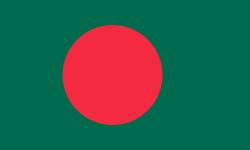
Repression of Workers Continues Under Bangladesh's Military-Backed Government
Since January 2007 the Bangladesh government has banned political and trade union activities and given itself "state of emergency" powers which severely limit civil rights. Labour rights activists and workers have been arrested, put under surveillance, interrogated or detained.
According to Human Rights Watch, police report that a number of international organisations and their staff members are being monitored for allegedly engineering or inciting "subversive" activities.
According to a message received from Bangladesh, many labour rights workers are finding it hard to continue their work in this climate of fear and repression:
"According to information provided by the media more than a dozen persons so far have been indicted in the cases filed in the past months. Electronic communication (cell phone, e-mail) of several concerned persons is also under surveillance. Media reports indicate that anyone considered to be a potential troublemaker irrespective of her/his profession or occupation would be indicted. Nobody is safe at this moment. Many trade union leaders are staying away from their known places as precaution.
The measures taken by the present regime are creating a repressive environment. The concerns of the workers or the root causes of the turbulence have not been considered in the least. Unruly workers, 'outsiders', unionists and rights activist all have been blamed to the extent that an 'international conspiracy' has been 'discovered' as the cause of the prolonged unrest. Even the deaths of workers on duty get lost in this deliberate construction of reasoning."
Serious unrest in Bangladesh's garment industry has been commonplace over the last few years, in part due to the inability of workers to express their grievances through union representation. The appalling conditions in the Bangladesh industry are well documented and include poverty wages, dire heath and safety conditions and long hours. The repressive measures taken by the Bangladeshi government fail to address the legitimate concerns of workers and the underlying causes of the turmoil.
We believe that all the stakeholders including factory owners, brands and public agencies must acknowledge and discharge their respective responsibilities in order to halt the repression and ensure the industry develops a more constructive approach to dealing with worker rights violations.
Please write a letter today and call on the government of Bangladesh to:
- stop all repression of workers, trade unions, researchers, workers rights activists and policy advocates;
- drop the false charges levied at labour rights defenders for carrying out their legitimate duties;
- enter into genuine and constructive dialogue with union representatives and labour rights defenders to develop sound industrial relations.
- repeal emergency laws banning freedom of association and trade union activity and;
- implement the tripartite agreement signed June 12, 2006 by the government, owners and workers' organisations detailing some of the fundamental rights of workers, including freedom of association.
This appeal is closed.
SAMPLE LETTER
Dear Dr Ahmed,
I am writing to raise my concerns about other labour rights defenders who may still be at risk of repression or detention under similar charges.
The ability of workers to organise freely to be able to negotiate to improve working conditions is vital if the garment industry in Bangladesh is to become sustainable over the long term. The current emergency laws, intense security surveillance and repression of labour rights make this almost impossible. These actions fail to address the very real labour problems in Bangladesh's garment industry which are causing the current and past disturbances: low wages, poor health and safety, long hours and discrimination. Enabling workers the freedom to associate and to express their legitimate grievances and demands would create more stability for everyone involved.
I am aware of the importance of the garment industry to Bangladesh, its economy and its people. I am concerned that the ongoing criminalisation of workers and their representatives under the emergency legislation will make matters worse and that the two million mainly female garment workers will bear the brunt of it.
I believe it is vital that workers are able to organise freely in order to create a healthy and sustainable industry for the future and I am calling on your government to ensure labour rights defenders are able to carry out their important work free from harassment and intimidation. In particular we call on your government to:
- stop all repression of workers, trade unions, researchers, workers rights activists and policy advocates;
- drop the false charges levied at labour rights defenders for carrying out their legitimate duties;
- enter into genuine and constructive dialogue with union representatives and labour rights defenders to develop sound industrial relations.
- repeal emergency laws banning freedom of association and trade union activity and;
- implement the tripartite agreement signed June 12, 2006 by the government, owners and workers' organisations detailing some of the fundamental rights of workers, including freedom of association.
I look forward to hearing about the positive steps forward taken by your government,
Sincerely,